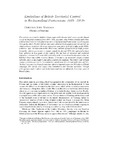Limitations of British territorial control in Bechuanaland Protectorate, 1918–1953

View/
Date
2010Author
Makgala, C.J.
Publisher
Routledge (Taylor and francis) www.routledge.comType
Published ArticleMetadata
Show full item recordAbstract
This article argues that the Kalahari desert region of the Kwena tribal reserve quietly slipped out of the imperial command from 1930–1950, at a time when British colonial authorities
achieved territorial control of the tribal areas of Bechuanaland Protectorate (now Botswana)through the chiefs. The British had reluctantly colonised Bechuanaland and initially left the
chiefs to their own devices. However, with a new generation of chiefs in office in the 1920s, numerous ‘ugly’ developments in the tribal areas, and lack of regulation of chiefly powers,
forced the colonial government to tighten control. By the mid-1940s this appeared to have
been achieved in most parts of the country. But the lack of resources and logistical
difficulties, combined with weak tribal leadership at the Kwena tribal headquarters made the Kalahari desert impossible to police. Hence, it became a safe haven for alleged criminal
elements, such as tax evaders and game poachers for example. The remote and isolated
village of Tsetseng proved to be a particular problem for the colonial authorities and this
‘lawless’ area was only brought back into effective imperial control in 1953 after a difficult campaign. The article also argues that consultation and Tswana succession through
primogeniture made indirect rule in Bechuanaland operate differently from other parts of
British Africa.
